ROBERT WILLIAMS BUCHANAN (1841 - 1901)
|
ROBERT WILLIAMS BUCHANAN (1841 - 1901) |
|
|
|
|
|
|
|
|
{Ballad Stories of the Affections. From the Scandinavian 1866}
137 [‘Axel and Walborg’ - continued]
VI. PRINCE HOGEN IMPEACHES WALBORG’S PURITY.
Then wroth grew young Prince Hogen, Up spake the good old archbishňp, ‘Water may quench the flaming fire, ‘Hot, hot is the summer sun, Young Hogen spake to young Axčl Wroth grew the young Prince Hogen, 138 ‘To-morrow shalt thou swear an oath ‘And must I swear upon my sword Sir Henrik’s wife, Dame Eskelin, ‘I dreamt my cousin Juliet rose ‘Lord, I have seven sons, and each |
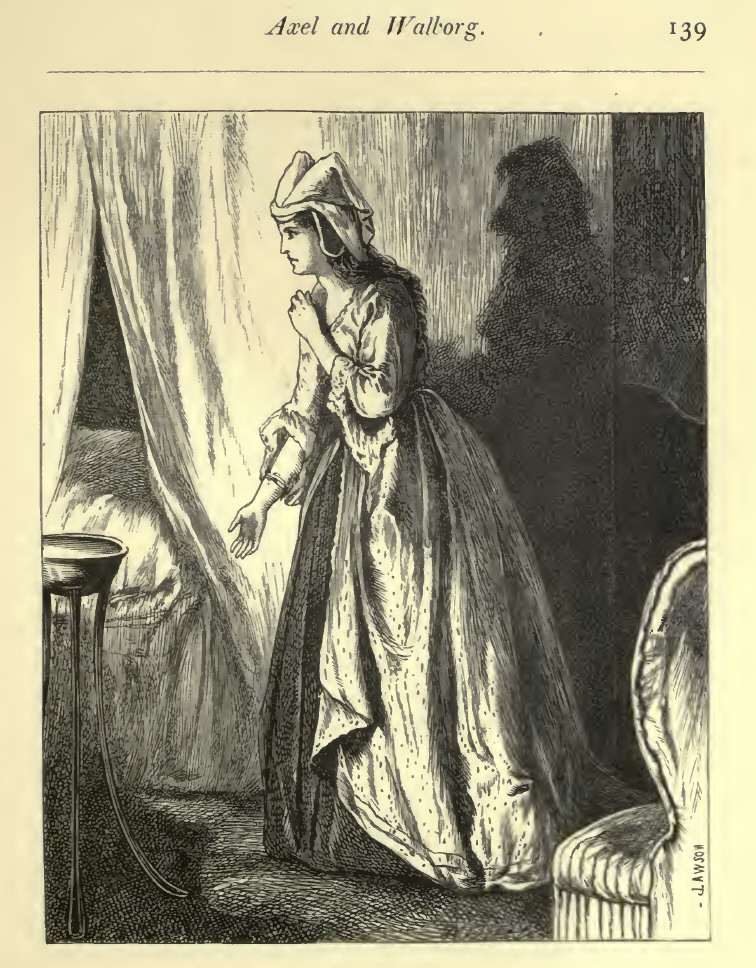 |
|
‘Lord, saddle, saddle ten good steeds, ‘Seven sons we now together have— 140 ‘I and Dame Juliet alsň The sun is shining on the heath, Sir Axel, all in armour clad, The seven knights then forward strode Then tears ran down the maiden’s cheek Then answered back her uncles three, 141 But murmured Erland, archbishňp, ‘Kinsmen thou hast full many here, ‘My father and my mother are dead, ‘Dame Juliet sleeps ’neath the marble stone, And while she sat in sorrow and fear, With hasty step he ran to her, 142 ‘Dame Eskelin, my own goodwife, ‘Now, forward, forward, my seven sons, Seven earls’ sons, in sable clad, Seven young counts stept forward next, ‘To swear the May is free from stain, One hand upon the Mass-book laid, 143 He held the sword-hilt in his hand, ‘Dear, dear to me is May Walborg, She touched the Mass-book with her hand, They raised bright banners o’er her head, Outspake young Prince Hogen He said, ‘The bonnie May Walborg 144
VII. THE LAST FAREWELL.
The cloth was spread, the board was filled, ‘Speak to me, speak to me, Heart’s Dearčst, ‘If they should wed me to the King ‘But I will gold embroidery sew, ‘She sleepeth not in greenwood bough, 145 ‘But thou, my lord, wilt gladly ride ‘Ay, thou, my lord, wilt merrilie ride ‘And if I chase in greenwood grove ‘My lands and goods I straight will sell ‘Dear lord, sell not thy goods and lands ‘Hie there, and woo the fair Alhed,’ 146 ‘Never will I fair maiden woo, In stept Erland, archbishňp, The archbishop raised up his hand, Sir Axel bade the May good-night, Fair Walborg hied to the high chamber, |
|||||
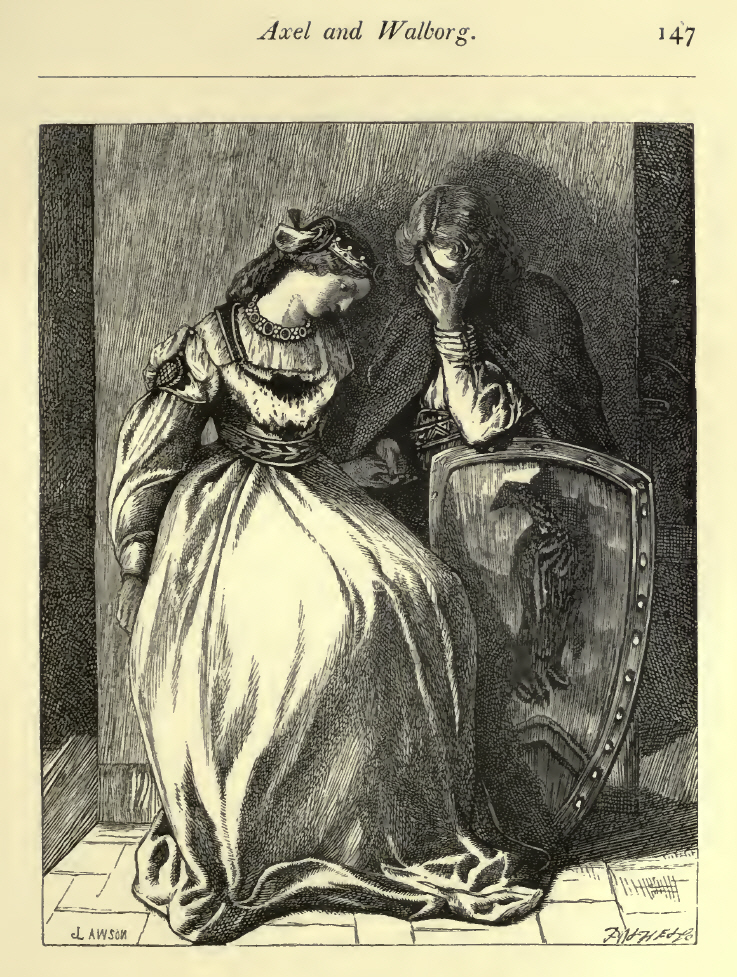 |
|||||
|
Early in the morning-tide, Queen Malfred bade her maidens sweet 148 ‘Hearken, Walborg, bonnie May! ‘Rather would I Sir Axel have, ‘Ah, little care my kinsmen proud,
VIII. HOGEN AND AXEL FIGHT AGAINST THE ENEMY.
A gloomy time, two weary months, Then came a war upon the land, 149 Prince Hogen called his men to field, It was the young Prince Hogen He called upon him every man Sir Axel’s shield was blue and white, There riding forth afield they saw Sir Axel strikes for fatherland, 150 Full many a gallant gentleman He slays the lords of Oppeland, As thick as hay by peasants tost, It was the young Prince Hogen ‘Hearken, Sir Axel Thorsen,— |
|||||
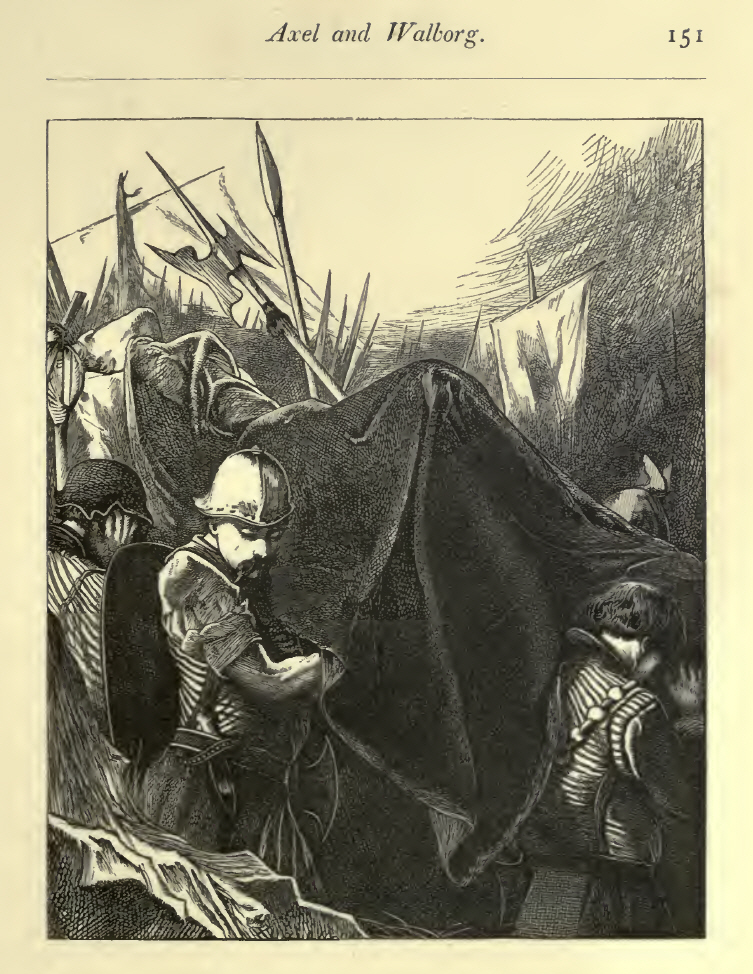 |
|||||
|
‘Terribly will I wreak thy death Sir Axel seeks the thick o’ the fight, 152 So manfullie Sir Axel fought, So manfullie Sir Axel fought, Still manfullie Sir Axel fought With eight red wounds upon his breast Ah! woefully Sir Axel bled ‘Say to my love a thousand “good-nights”; 153
IX. WALBORG HEARS THE FATAL NEWS.
In before the fair Queen’s board ‘Maidens, who sew the linen white ‘Dead is the young Prince Hogen, ‘And they have won the victorie, Ah! bitterlie Queen Malfred wept 154 May Walborg called her little page, ‘Place my gray steed in the chariot red,— Without the Kirk of our Ladie She took the gold crown from her head, ‘Twice have I been a maid betrothed, 155 X. WALBORG TAKES THE VEIL.
They brought to her the red, red gold She took the great neck-band of gold, Unto Sir Henrick next she gave She took a hundred golden rings, She dowered the kirk and cloister old, She gave to widows and fatherless bairns, 156 ‘Hither, hither, O archbishňp, ‘Hither, hither, O archbishňp, Many and many a gallant knight So sweet Walborg in cloister dwelt Full many a noble woman and maid |
|||||
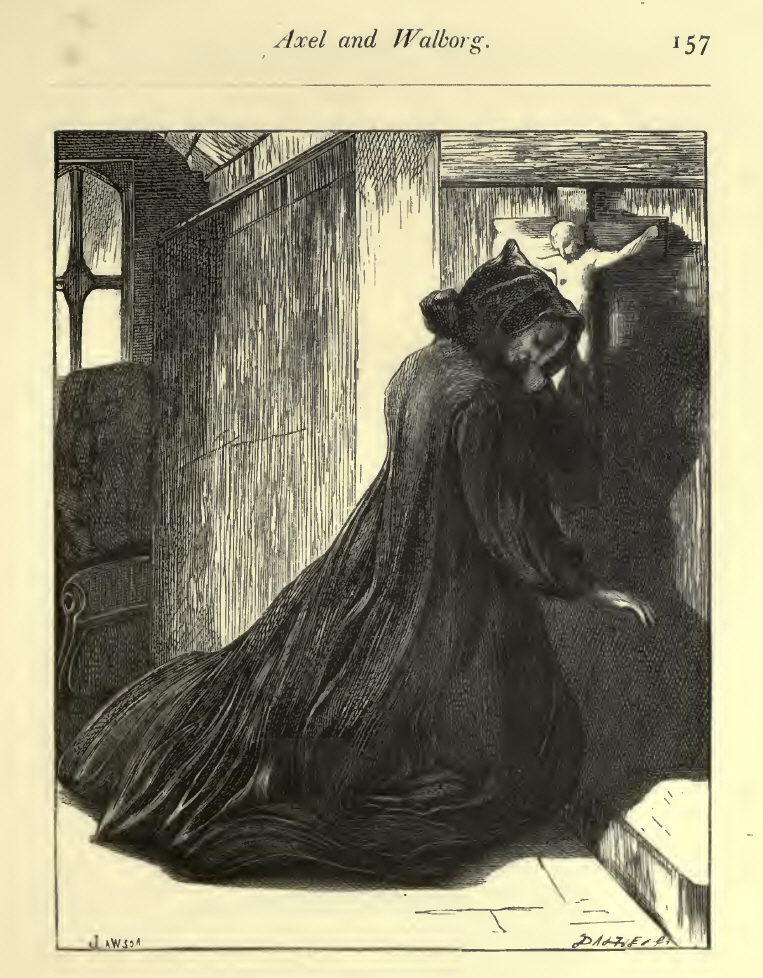 |
|
Far better never be born at all God’s ban be on the wicked churl, 158
I LOVE you, Heaven’s divinest blue! I love the shadowy blue of waves, I love the blue of yonder plots, The blue for me—and here it lies,
159
IN the warmth of a singer’s chamber, where never wild wind blew, The sweet wood sent out knots, and each a red rose gave: Then came the Angel who smileth through tears while mourners weep, And his friends fulfilled his wish: the tree grew over the dead; But the cold, cold winds of night blew in the leaves of the tree; Poor tree! in the air of freedom thou couldst not live and grow,
160
‘LITTLE CHRISTINA, come dance with me, ‘A silken sark is a precious thing, “’Little Christina, come dance with me— ‘Two silver shoes were a guerdon fair, ‘Little Christina, come dance with me, ‘A red gold band is a precious thing, ‘Little Christina, come dance with me, |
|||
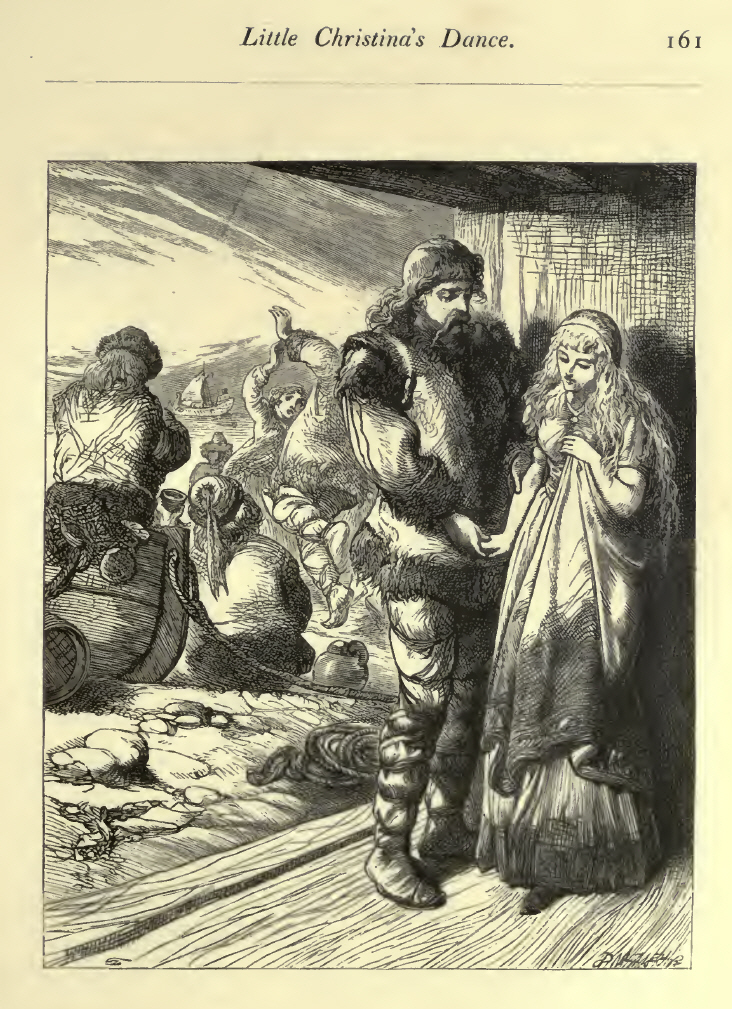 |
|||
|
‘I dance not for half of golden ring— ‘Little Christina, come dance with me— 162 ‘Two silver knives were a guerdon fair— ‘Little Christina, come dance with me, Into his arms leapt the little one fair— Round and round the dancers sped, ‘My troth and plight I have given to thee”— The days and the nights have swiftly flown: On a mantle spread in a secret place, To the King on his throne a murmur runs— Lonely little Christina lies: * This plighting of troth was, as nearly as possible, equivalent to marriage. |
|||
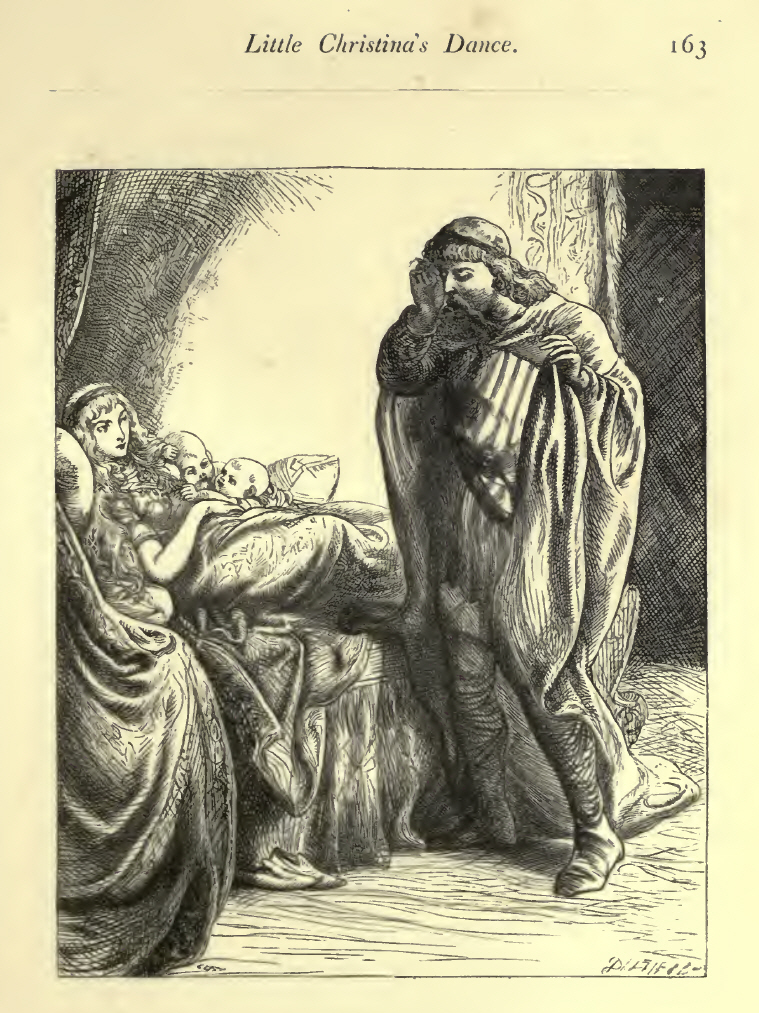 |
|
The monarch stands by the maiden’s bed,— He covers his face with his mantle blue: 164 ‘Now God the Father forgive my shame! ‘My father wandered the ocean o’er; ‘Thither came men of the stormy sea, ‘Thither came men of the stormy sea, ‘With none of them danced I night or day, ‘A stranger plighted his troth to me— ‘Hearken, little Christina, to me: ‘He gave me a sark of the silk so fine,— ‘He gave me shoes of the silver bright,— ‘He gave me a band of the red, red gold,— ‘He gave me the half of a golden ring,— 165 ‘He gave me two silver knives of price,— The monarch trembled and tried to speak, ‘O little Christina! my sweet! my true! ‘O little Christina! my sweet! my true! He clasps in his arms the little one fair, The rumour wanders from town to town— Little Christina is throned in pride—
166
WHILE the white snows are falling And gray old Hans sits talking ‘Ay, boy! when the cock croweth |
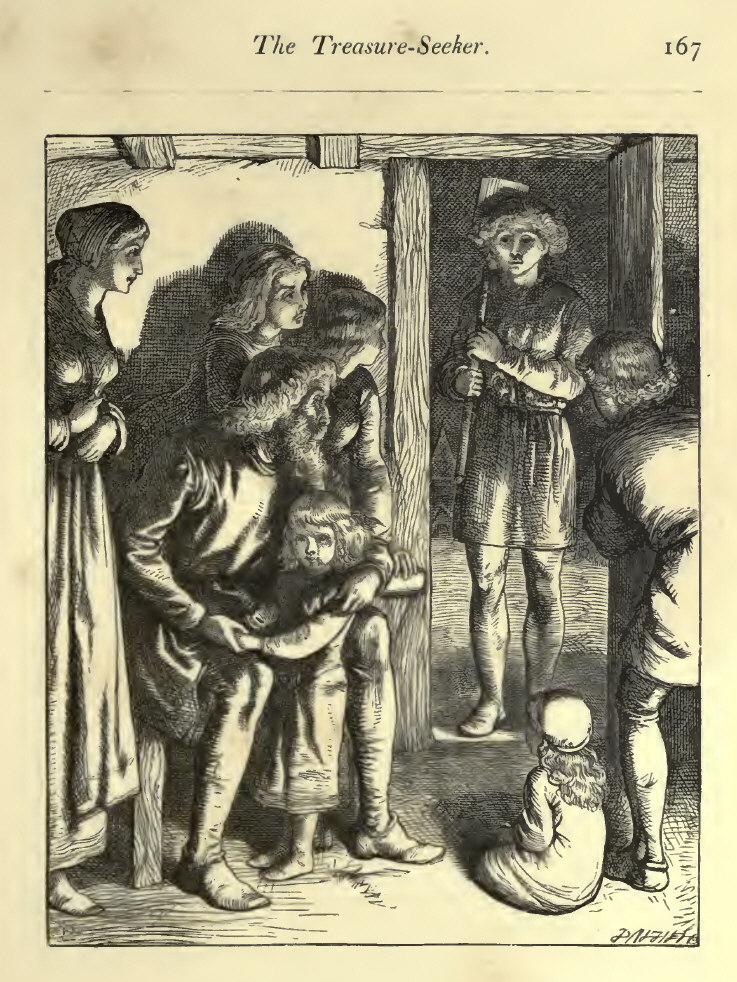 |
|
By strange wild thoughts kept silent, And bearing spade on shoulder 168 ‘Chill, chill is all without there! Bloody and pale he standeth, ‘Follow!’ he crieth, showing In the chill mist of midnight Nearer they creep, and nearer, ‘See!’ cried the stripling, pointing, ‘O God that art in heaven! 170 ‘See! see how still he lieth
171
IT is wake to-night, it is wake to-night! Fair Signelil to her mother spake, ‘What wouldst thou there, O little one? ‘If thou alone to the wake-room go, ‘There dance the King and his companie: ‘The Queen and her maidens are also there, So long the maiden prayed and cried, ‘Go then, go then, if thou must, my child, 172 Alone she went through the greenwood gloom As o’er the dusky meads she sped, Into the wake-room Signe tript; Madder dance could never be; The King stretched out his hand in glee, ‘Over the dale have I come to see ‘Dance with me and my merry men— Light and lithe as a willow wand ‘Signelil, pause on thy small white feet; ‘I know no love-song, sad or gay, Sweet she sang: the King stood nigh; 173 The pale Queen heard upon her bed: ‘Who dares to linger after me, Answered the page in kirtle red, ‘None of thy maidens linger still; ‘My cloak and hood come give to me; Better dance could never be; Round and round in a ring went they: ‘Sin and sorrow!’ thought the Queen, The pale Queen whispered quietlie, The King reached out his hand: ‘Sophič, ‘I will not dance till this maiden fine 174 Signelil drank the wine so red,— Long looked the King on that maiden sweet, ‘I have never, since I drew breath, Maids and good women wept full sore There ne’er had been so black a deed, _____
Back to Ballad Stories of the Affections - Contents or Poetry
|
|
|
|
|
|
|